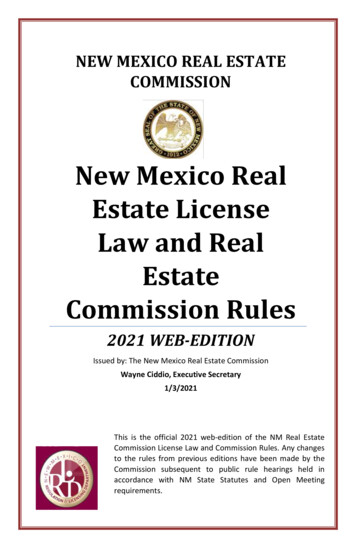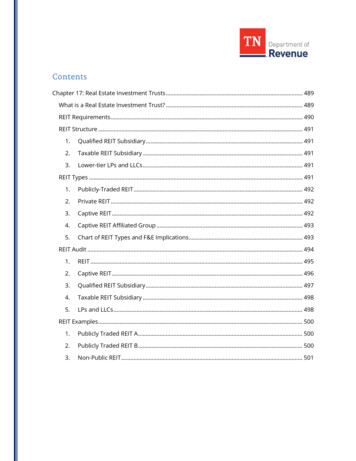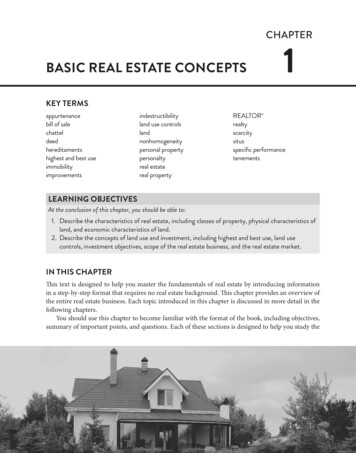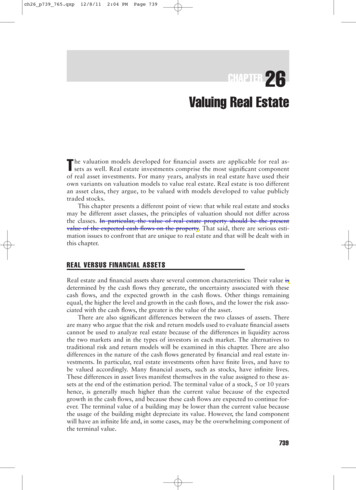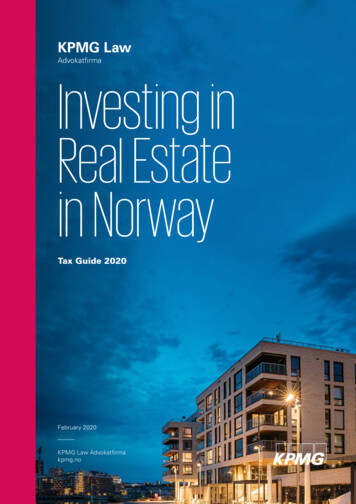
Transcription
2021 Asia Pacific Real EstateREPORTSavills ResearchInvestmentCountry Guide
Asia Pacific Real EstateAsia Pacific NetworkSavillsAsia Pacific OfficesAustraliaAdelaideBrisbaneCanberraGold CoastLindfieldMelbourneNotting HillParramattaPerthSunshine CoastSouth SydneySydneyCambodiaPhnom Penh henTianjinWuhanXiamenXi’anZhuhai*Associate OfficeHong Kong SARCentralQuarry Bay (3)Taiwan, abadMumbaiPuneThailandBangkokAsia464VietnamDa nangHo Chi Minh City2OfficesIndonesiaJakartaJapanTokyo4Macau SARMacauMalaysiaJohor BahruKuala LumpurPenangNew ZealandAucklandChristchurchPhilippinesCebu*Makati City *Australia &New Zealand15OfficesSingaporeSingapore (4)South KoreaSeoulSavills is a leading global real estateservice provider listed on the LondonStock Exchange. The company,established in 1855, has a rich heritagewith unrivalled growth. The companynow has over 600 offices and associatesthroughout the Americas, Europe, AsiaPacific, Africa and the Middle East.In Asia Pacific, Savills has 61 regionaloffices comprising over 29,000 staff.Asia Pacific markets include Australia,China, Hong Kong, India, Indonesia,Japan, Macau, Malaysia, New Zealand,Singapore, South Korea, Taiwan,Thailand and Viet Nam. Savillsprovides a comprehensive range ofsavills.com.hk/insight-and-opinion/advisory and professional propertyservices to developers, owners, tenantsand investors.These include consultancy services,facilities management, space planning,corporate real estate services, propertymanagement, leasing, valuation andsales in all key segments of commercial,residential, industrial, retail, investmentand hotel property.A unique combination of sectorknowledge and entrepreneurial flairgives clients access to real estateexpertise of the highest calibre. Weare regarded as an innovative-thinkingorganisation supported by excellent2negotiating skills. Savills chooses tofocus on a defined set of clients, offeringa premium service to organisationsand individuals with whom we share acommon goal.Savills is synonymous with a highquality service offering and a premiumbrand, taking a long-term view ofreal estate and investing in strategicbusiness relationships.
Investment Country GuideContentAustralia05China13Hong es53Singapore57South Korea63Taiwan67Thailand71Viet Nam77UK81US873
Investment Country GuideAustraliaThe Australian economy grew by 3.3% in the Septemberquarter meaning we are no longer in recession and markingthe beginning of economic recovery from the Pandemic.Household consumption grew by close to 8% following easedrestrictions in the majority of states and territories, thisfollowed a drastic decline of 12.5% last quarter. Althoughthis is only the beginning of the recovery, with relativeunemployment expected to be high for a number of years.The household savings ratio increased to 12.4% inSeptember, following a period of low savings ratios whereit has sat at sub 5% for the last four years. The InternationalMonetary Fund World Economic Outlook is forecasting forAustralia’s economy to contract by -4.2% in 2020 as a result ofCOVID-19, with the outlook of a recovery in 2021 which wouldsee GDP growth of 3.0%. This was positively revised upwardsfrom the June outlook.The Federal government’s economic support packageof AU 259 billion will help to soften the impacts felt byAustralian individuals and businesses. This includes theJobKeeper program which will provide a wage subsidy toAustralians who otherwise may have been unemployed, alongwith early superannuation release of up to AU 20,000 foreligible individuals. More recently, the HomeBuilder schemewas introduced that would provide eligible owner-occupiers aAU 25,000 grant to build a new home or undergo substantialrenovations. The aim of the scheme is to create economicactivity within the residential construction sector.TYPES OF PROPERTY OWNERSHIPMost Australian land is held under the Torrens title system,through land registries established in each state and territory.While the system is essentially the same in each Australianstate and territory, the registration requirements vary.Under the Torrens title system, the relevant state or territoryguarantees title to the person who is recorded on the registeras the owner of the land (the exception being in the case offraud). A transfer of ownership of Torrens title land is effectedthrough a change of the record on the register. The registeredowner holds their ownership interest subject to priorregistered interests and, subject to the relevant legislation ineach state and territory, free from most interests which arenot registered. In other words, priority between interests isestablished by the order in which they are registered, not bythe order in which they are executed (or signed).As the state or territory guarantees the accuracy of theregister, prospective purchasers can rely on the informationon the register and act on the basis of it.The most commonly recognised interests in Australianland are detailed as follows.Freehold estate in fee simpleThis is the most common form of land ownership in Australia,and represents the most complete ownership interestavailable to persons other than the Crown. A fee simple estateis of unlimited duration.Leasehold interestLeasehold interest is the interest which a tenant or lesseeacquires from the owner of the land to use and occupy theland for a limited period. Most commercial leases are for afixed period of time. Generally, where the land is owned bythe Crown, a person may take a long-term (often 99 years)leasehold interest from the Crown. Leasehold interests aregenerally required to be registered. Options to extend theterm of the lease may also be negotiated.Other interestsOther types of interest in land which may be registeredinclude: Mortgage interests – which generally secure repayment of aloan or other financing arrangements; Options to acquire land;KEY STATISTICSOfficial nameAustraliaCurrencyAustralian dollar (100 cents)floating currencyUS 1 AU 0.77 (January 2021)Population25.69 million (June 2020)Land area7.69 million sq kmGross domestic product (GDP)per capitaAU 17,371; US 12,639 (June 2020)GDP growth2.4% per annum (2017)2.9% per annum (2018)1.9% per annum (2019)Principal business centresCanberra, Sydney, Melbourne, Brisbane, Perth, AdelaideSource Australian Bureau of Statistics5Paul CraigCEO 61 2 8215 8888pcraig@savills.com.auMonique BirdAnalystValuation & Advisory 61 2 8913 4845mbird@savills.com.au
Asia Pacific Real Estate Easements – which generally convey a right touse a particular part of someone else’s land for aspecific purpose, but not to occupy the land; Restrictive covenants – a covenant given bythe owner of one parcel of land to the owner ofanother parcel of land, by which the first owneragrees not to use their land in a particularway, for the benefit of the second owner; forexample, an agreement by one owner not tobuild any structures which would impede theneighbouring owner’s views.Non-torrens title landWhile most Australian property is nowregistered under the Torrens title system(including all land in Queensland and theNorthern Territory), some areas of land havenot been converted. Unconverted parcels of landtypically fall into one of the following categories: Crown land – land owned by a state orterritory of Australia or by the Commonwealthof Australia; Old system land – generally rural land.Most states and territories have proceduresfor converting old system land to Torrens titlewhenever a new dealing with the land is lodgedwith the land registry.Native titleNative title was first recognised in Australiain 1992, when the High Court of Australiafound that the traditional Aboriginal ownersheld native title over certain land. A nationalscheme, implemented through legislation ineach state and territory, governs the validityof land dealings affecting native title andestablishes a process to deal with native titleclaims. Native title rights can be compulsorilyacquired or surrendered under law, but cannotbe transferred. Although native title is mostrelevant to non-freehold land and Crown- orCommonwealth-owned land, a prudent buyerwill take native title into account in relation tomost land dealings.OVERSEAS OWNERSHIPRESTRICTIONSThe Australian government reviews andevaluates certain overseas investment proposals.Investment proposals by overseas interestsare regulated by the Foreign Acquisitions andTakeovers Act 1975 (Cth) (FATA). FATA isadministered by the Treasurer, who is assistedby the Foreign Investment Review Board(FIRB), a division of the CommonwealthGovernment Treasury. The Commonwealthgovernment publishes policy guidelines for theadministration of FATA.Like most countries, Australia has rules andrestrictions on the acquisition and ownershipof property by foreign interests. The ons and exemptions are complicatedhowever foreign persons are normally givenapproval to buy: Vacant land for development, includinghouse and land packages where constructionhas not commenced, subject to a conditionimposed under the FATA that continuousconstruction commences within 24 monthsfor residential developments, or five years forcommercial developments not to be used forresidential purposes (From 1 July 2017, land isnot considered vacant if a wind or solar powerstation is located on the surface of the land); and New dwellings such as house and landpackages, home units and townhousespurchased ‘off the plan’ that is, underconstruction or newly constructed, but neveroccupied or previously sold. ‘Off the plan’sales to foreigners are only permitted for newdevelopment projects or extensively refurbishedcommercial structures, which have beenconverted to residential.6 Certain categories of foreign nationals,who hold a visa that permits them to residein Australia continuously for at least the next12 months (such as students), may be givenapproval to purchase only one establishedresidential real estate (that is, second handdwellings) for use as their principal place ofresidence (that is, not for rental purposes)while in Australia. Approved temporaryresidents with valid visas will normally beallowed to purchase only one establisheddwelling to live in as their residence (home)in Australia, subject to the conditions thatthey: use the property as their principal placeof residence in Australia; do not rent any partof the property, including ensuring that it isvacant at settlement; and sell the propertywithin three months from when it ceases to betheir principal place of residence. Foreign companies, with an establishedsubstantial business in Australia, buyingfor named senior executives resident inAustralia for periods longer than 12 months,may be eligible for approval provided the
Investment Country Guideaccommodation is sold when no longer requiredfor this purpose. Whether a company is eligible,and the number of properties that may beacquired, will depend upon the extent of theforeign company’s operations and assets inAustralia. Unless there are special circumstances,foreign companies normally will not be permittedto buy more than two houses under this category.Foreign companies would not be eligible underthis category where the property would representa significant proportion of its assets in Australia. From 1 December 2015, applicants will pay afee before their foreign investment applicationis processed. For a property valued underAU 1 million a fee of AU 5,000 is payable.For properties valued over AU 1 million afee of AU 11,100 is payable then AU 11,100incremental fee increase per additional AU 1million in property value. Advanced off-the-plancertificates require a fee of AU 25,700 upfront. Property developers can apply for a NewDwelling Exemption Certificate for a specifieddevelopment if the development: will consist of50 or more dwellings (other than townhouses);has development approval from the relevantgovernment authority; and if applicable, foreigninvestment approval was given to purchase theland and that conditions are being met. TheGovernment will tighten the rules around theuse of advanced off-the-plan certificates bylimiting the value of all apartments that canbe bought by a single foreign investor to AU 3million in the one development. If foreigninvestors want to purchase apartments abovethis value, they will have to seek individualapproval.Proposals by foreign persons to acquiredeveloped residential real estate that does notfall within the above categories are subject tothe FATA, but are not normally approved.There has recently been a reform to the Actwhich would see the below changes. It is worthnoting the legislation is still in draft and ifpassed will come into action in January 2021: The Treasurer will be allowed to imposeconditions or block investment in sensitive7sectors by a foreign person on nationalsecurity grounds regardless of the value ofinvestment. A mandatory pre-investmentnotification will be required from foreignpersons who are seeking to acquire a directinterest in or start to carry on a ‘sensitivenational security business’ which may includecritical infrastructure, telecommunicationsbusinesses, defence-related business or land,national security supply chain as well as data.The Treasurer will also have a ‘call-in’ powerto review investments normally not notifiableunder the national security mandatory preinvestment notification process. A last resortreview power will also be introduced to allowthe Treasurer to reassess previously approvedinvestments in subsequent national securityconcerns arise;- Less sensitive Foreign GovernmentInvestors (FGIs) may get more flexibility,meaning investment funds with passiveFGIs may be treated as private foreignpersons subject to higher monetarythresholds when their government
Asia Pacific Real EstateA substantial interest exists where thereis an interest of 20% or more in ownership,voting power or potential voting power bya single person or corporation (togetherwith associates) or 40% or more in aggregateownership, voting power or potential votingpower by two or more persons or corporations(together with their respective associates).Potential voting power refers in general termsto the number of votes that can be cast in ageneral meeting of a corporation.Proposals relating to urban landOverseas entities wanting to acquire urbanland (including interests that arise via leases,financing and profit-sharing arrangements)must make a proposal to FATA. Proposals mustbe made in regard to the following: Developed non-residential commercial realestate where the property is subject to heritagelisting and valued at AU 5 million or more (inthe case of both US and non-US investors); Developed non-residential commercial realestate, where the property is not subject toheritage listing, valued at AU 55 million ormore in the case of non-FTA countries, withinvestors from FTA countries (US, Chilean,Japanese, Korean and New Zealand) allowed upto AU 1,094 million; Accommodation facilities, valued at AU 55million or more;investors have no influence or control overthe decisions of the investment funds;- Tracing rules will be stricter to captureunincorporated limited partnerships;- Stronger compliance and monitoringpowers will be introduced to allow forsite-based inspections to examine whethercertain conditions are being complied with;- Register of Foreign Ownership to beestablished and increased informationsharing between government agencies andinternational counterparts; and The Treasurer will have stronger and morevaried enforcement powers to proactively curtailbreaches before they occur. This may meanhigher compliance cost for foreign investors.The Government will also be able to impose civilpenalties and infringement notices and takeother actions if foreign investment approval wasgiven based on an application that is incorrect, oromits an important piece of information;- Increased penalties for breach ofconditions or the law for both civil andcriminal liabilities;- Clarification that approval is required forinterest increase as a result of share buybacksor selective capital reductions;- Scope of the moneylending exemptionis narrowed so that the potential loopholeof using the exemption to avoid the strictapproach to national security businesses isclosed;savills.com.hk/insight-and-opinion/- The fees framework will be reviewed tobe made fairer and simpler. It may also beincreased in certain areas to reflect theenlarged roles and responsibilities acrossthe government.Meaning of ‘foreign interests’The expression ‘foreign interest’ has a verytechnical meaning under FATA. There arecomplex tracing provisions, which have a broadreach. However, in general terms, a foreigninterest is: A natural person who is not ordinarilyresident in Australia; An overseas government or its agencies; Any corporation, business or trust in whichthere is a ‘substantial interest’ held by anoverseas person or corporation.8 Vacant real estate irrespective of value; Residential real estate irrespective of value(subject to certain exceptions as outlinedbelow); Shares or units in Australian urban landcorporations or trust estates, irrespectiveof value, must be approved by the Treasurerbefore they can be implemented and shouldbe presented to FIRB in advance. Failure tonotify may result in an order for compulsorydivestment.You do not need prior approval to acquireresidential real estate if you are: An Australian citizen living abroad; An overseas citizen purchasing, as a jointtenant, with your Australian citizen spouse; An overseas citizen who holds a permanentresident visa; A New Zealand citizen.Proposals relating to rural landThe definition of rural land includes all landthat is used wholly and exclusively for carrying
Investment Country Guideon a substantial business of primary production.A substantial business of primary productionmust have a commercial purpose or character andbe involved in activities relating to the cultivationof land, animal husbandry/farming, horticulture,fishing, forest operations, viticulture or dairyfarming, but does not include vacant land, hobbyfarms, land used for stock agristment or mining.The Government has passed legislation whichrequires that, from 1 July 2015, foreign personsand foreign government investors holdinginterest in agricultural land must register thoseinterests with the Australian Taxation Office(regardless of value).All existing holdings must be registered by 31December 2015 and any new interests must beregistered within 30 days of contract exchange.Proposed acquisitions of rural land valued atAU 15 million or more (or the relevant thresholdfor US, New Zealand, Chilean, Singaporean orThai investors) must be approved by FIRB1.ContractsAll contracts which are being used by overseasinvestors for the purchase of Australian realestate for which FIRB approval is required mustbe made conditional upon FIRB approval (unlessapproval has already been granted). Contractsshould provide for a minimum of 40 days fromthe date of lodgement for a decision from FIRB.For any properties being purchased at auction,prior FIRB approval must be obtained.MEASUREMENT OF AREASMeasurements generally used in the propertyindustry are quoted as set out below by theProperty Council of Australia: Gross lettable area – retail: the aggregate floorspace contained within a tenancy at each floorand used for calculation in shopping centres,commercial buildings and shops generally. Gross lettable area: the floor space containedwithin a tenancy at each floor and used forcalculation in warehouses, industrial buildings,freestanding supermarkets and showrooms. Net lettable area: the sum of the whole-floorlettable areas, used in calculating area in officebuildings and office parks.LEASE TERMSLease terms vary, depending on the location andtype of the property. The following summaryoutlines some common terms found in Australianretail and commercial leases:Lease period2 Retail: in most Australian states andterritories, the relevant retail leasing legislationstipulates a minimum lease term (five years inmost jurisdictions) unless this is waived by thetenant. Generally, lease terms from three to five1 Information current as of 1 December 2017.2 The period or term of the lease.years are the most common, although longerleases may be available. Commercial (including office and industrial):subject to any specific requirements underlegislation in each state or territory, commercialleases can be for any length of time. In mostcases, commercial leases are between five and tenyears.A tenant may also be able to negotiate optionsto extend the lease for a number of further terms.Rent reviews3The rent payable under the lease may be subjectto periodic review using a predeterminedmethod: for example, a fixed review to increasethe rent by 5% per annum and/or by reference tothe consumer price index (CPI).Sub-letting/assignment4A tenant might agree to sub-lease or to assignspace which they are leasing to a third party.Normally, this cannot be done without thelandlord’s permission. If the landlord approvesthe sub-lease or assignment, they may requirethe sub-lessee or assignee to provide guaranteesor other security, depending on the terms of theoriginal lease.RepairsThe party responsible for making repairs to thepremises is generally set out in the lease. It iscommon for the landlord to be responsible formajor structural and capital works, and for thetenant to be responsible for maintaining thepremises (subject to fair wear and tear) and forrepairing any damage caused by the tenant. Someleases also contain clauses dealing with the fitout of the premises and “make-good” obligations,where each party is made responsible for specificmaintenance/make-good obligations at thebeginning and/or end of the lease.Security of tenure5Security of tenure only extends for the durationof the lease.Security of performanceGenerally, a landlord will require securityfor performance by the tenant of the tenant’sobligations under a lease. This can be by way of abank guarantee, cash deposit bond or company/personal guarantees.Termination of a leaseLeases generally terminate upon their expirydate. Options to renew may be built into thelease by negotiation. Commercial (retail, office3 A periodic review of rent under a lease using a predeterminedmethod. For example, an increase in line with CPI, or in accordancewith a market valuation.4 A contract whereby the whole or part of the property is let toanother person, the party letting being themselves a lessee. Theobligations of the lessee to the lessor are not diminished. Thelength of the sub-lease must not be longer than the unexpired partof the lease.5 When the term is used in connection with renting, it means thecertain term for which a tenant may remain in occupation.9and industrial) leases do not normallycontain provisions requiring either partyto be compensated on termination of thelease, except where the termination is dueto default. Retail tenancy legislation inmost states and territories may also requirecompensation to be paid to retail tenants ifthe landlord exercises a right to terminate thelease pending demolition or redevelopment ofthe premises.TRANSACTION COSTSBrokerage/agency feesLeasing fees are typically paid by the landlordand are negotiable prior to appointmentand will be dependent on whether it is aconjunctional or sole-agent appointment.Typically, leasing fees amount to 15% of thefirst year’s rent.On transactions, typical fees are in therange of 0.75% to 1.5% of the agreed price forcommercial, industrial and retail properties.Fees on residential transactions will be higher.Legal feesTransaction and statutory search fees willvary depending on the solicitor instructed, thecomplexity and size of the transaction, and onthe nature and location of the property.Registration fees and leviesThe land registry in the relevant state orterritory will charge registration fees forregistering a purchaser’s interest in the land(and for registering any mortgage or otherdealing on the land). In some jurisdictions (forinstance New South Wales), a levy is payablein addition to the registration fee prior to theland registry attending to registration of thepurchaser’s interest in the land. The amountof these levies is dependent on the purchaseprice of the land.TAX LEGISLATIONIn Australia, power to levy tax exists at bothcommonwealth (i.e., federal) and state levels.The federal government levies taxes suchas income tax, and goods and services tax(GST). Taxes levied by state governmentsinclude stamp duty, land tax and payroll taxas well as transaction duty, fees and chargeson certain kinds of business transactions.At the federal level, taxation isadministered by the Australian TaxationOffice (ATO). At the state and territory level,the relevant taxation authority is the StateRevenue Office of the applicable state orterritory.Stamp dutyStamp duty is a tax imposed at the state/territory level. As a result, the stamp dutypayable on a purchase of land will depend onwhere the land is situated. Stamp duty mayalso be payable on the purchase of shares in a
Asia Pacific Real EstateTABLE 1 Marginal Rates Of Land Tax For Commercial Property*STATEAustralian Capital Territory (ACT)New South Wales (NSW)TAX-FREETHRESHOLD (AU )TOP THRESHOLD(AU )TOPRATETRUST SURCHARGEREGIMEFOREIGN OWNER LANDTAX 0%YesYesNorthern Territory (NT)The Northern Territory does not currently impose land tax on property ownersQueensland (QLD)600,00010,000,0002.25%YesYesSouth Australia NoVictoria (VIC)250,0003,000,0002.25%YesYesWestern Australia (WA)300,00011,000,0002.67%NoNoTasmania (TAS)Source ATO / State Revenue Offices*Information current as of September 2020. Note that different marginal rates may apply, depending on property type and value. Please refer to the applicable State orTerritory revenue office website for up-to-date information.TABLE 2 Income Tax Rates For Australian Residents (2020-2021)TAXATION INCOME(AU )0–18,20018,201–45,000TAX ON THIS INCOMENil19 for each AU 1 over AU 18,20045,001–120,000AU 5,092 plus 32.5 for each AU 1 s over AU 45,000120,001–180,000AU 29,467 plus 37 for each AU 1 over AU 120,000180,001 overAU 51,667Source Savills Research & ConsultancyTABLE 3 Income Tax Rates For Non-Australian Residents(Foreign Resident Tax Rates 2020-2021)TAXATION INCOME(AU )0–120,000TAX ON THIS INCOME32.5 for each AU 1120,001–180,000AU 39,000 37 for each AU 1 over AU 120,000180,001 overAU 61,200 45 for each AU 1 over AU 180,000Source Savills Research & Consultancycompany, particularly where the company is“land rich”. Stamp duty is generally chargedat an incremental rate, based on the higher ofthe market value of the property transferredand the GST-inclusive consideration. Certainexemptions and concessions may be available.For the latest rates please contact the StateRevenue Office in the relevant state orterritory. Stamp duty is generally payable bythe purchaser, either by law or by commercialagreement, but in some jurisdictions theseller and purchaser are jointly and severallyliable. The transfer of title to land cannot beregistered until stamp duty has been paid. Thestate of South Australia has abolished stampduty on commercial property transfers.Land taxLand tax is also imposed at the state/ territorylevel. As a result, the rate of land tax, thethreshold at which it becomes payable andthe date on which it is assessed and paidwill depend on where the land is situated.Generally, land tax is payable by the currentowner as of 31 December or 30 June ofthe current year, and is assessed on theunimproved land value. Certain exemptionsmay be available (for example, land tax isgenerally not payable on a principal place ofresidence). The current maximum marginalrates of land tax for commercial property areshown in Table 1.Corporation taxThe tax rate for public and private companies,resident and non-resident, is currently 30%.Income taxIndividuals, trustees, superannuation fundsand companies deriving income from ansavills.com.hk/insight-and-opinion/10
Investment Country GuideAustralian source must apply to the ATO for anAustralian tax file number and must lodge anannual tax return with the ATO. Entities whichcarry on an enterprise in Australia also require anAustralian business number.Income tax is payable by individuals, trustees(in certain circumstances), superannuationfunds and companies. Australian income taxis imposed on a single measurement of taxableincome, which is calculated as the sum ofassessable income derived by the taxpayer duringthe relevant year of income, less ‘allowabledeductions’, i.e.,Taxable Income Assessable Income Allowable DeductionsAustralian tax residents are generally liableto pay income tax in respect of their worldwideassessable income, whereas non-Australiantax residents only pay tax on that part oftheir income which is derived from sources inAustralia. However, this principle may be subjectto the application of double taxation agreements(DTAs) which Australia has entered into with anumber of other countries (please refer to thesection ‘Withholding tax’ overleaf for a list ofcountries).Taxation rates for individuals differ,depending on whether the individual is anAustralian tax resident or not. The marginalrates of taxation applicable for Australian taxresidents for the financial year from 1 July 2020to 30 June 2021 are shown in Table 2.In addition, individual Australian taxresidents must pay a Medicare Levy of 2%of taxable income, subject to low-incomethresholds, phase-in limits and surcharges forindividuals without private health insurance.The marginal rates of taxation applicable fornon-Australian tax residents for the financialy
2021 Asia Pacific Real Estate Investment Country Guide. savills.com.hkinsight-and-opinion/ 2 Asia PaciAc Real Estate . real estate and investing in strategic business relationships. Asia Pacific Network. 3 Investmen ountr uie Content 05 13 25 31 37 43 47 53 57 63 67 71 77 81 87 Australia China Hong Kong I
